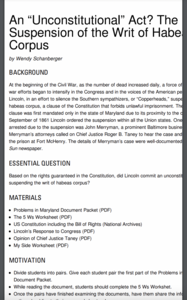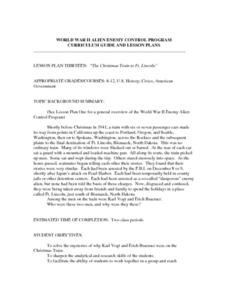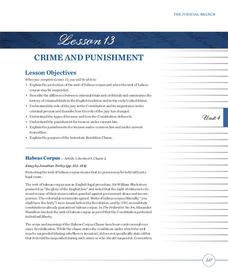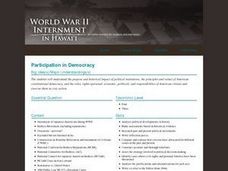DocsTeach
Alfred Sinker and the Writ of Habeas Corpus in 1861
Scholars learn how the judicial system treated under-age Civil War soldiers using historical analysis. The resource uses court documents to help historians understand why Habeas Corpus was used in the case of Alfred Sinker and why he was...
DocsTeach
Lincoln's Suspension of Habeas Corpus During the Civil War
What is the balance between constitutional rights and security during a war? Young historians debate the question while looking at Lincoln's decision to suspect habeas corpus during the Civil War. After reviewing his order, discussion...
Curated OER
An "Unconstitutional" Act? The Suspension of the Writ of Habeas Corpus
Students explore the implications of habeas corpus. In this Civil War lesson, students analyze the writ of habeas corpus by Lincoln during the war. Students examine primary sources from Lincoln and Chief Justice Taney. Students design...
Curated OER
Debates Over Suspension of the Writ of Habeas Corpus
Eighth graders study the concept of Habeas Corpus. In this Civil War lesson, 8th graders research the reasons for and against suspending the writ of habeas corpus. Students analyze various documents.
Curated OER
Andrew Jackson and the Use of Martial Law and the Suspension of Habeas Corpus
Students explore the use of martial law at the Battle of New Orleans. In this Andrew Jackson lesson plan, students analyze primary documents pertaining to the move by Jackson to use martial law in the battle. Students then consider...
Curated OER
Habeas Corpus and“Enemy Combatants”
Students explore the implications of habeus corpus. In this habeus corpus lesson, students participate in reader's theatre activity regarding the origin of habeus corpus. Students then investigate the Hamdi v. Rumsfeld case and determine...
Read Works
A Constitution for Kids
What better day to celebrate the US Constitution than on Constitution Day! After reading a short passage about the different understandings of habeas corpus and ex post facto, sixth graders respond to 10 multiple choice and short answer...
Curated OER
English Constitutional Monarchy
Whether you are teaching British Literature, British History, or are simply interested in the history of English politics, this presentation takes the viewer on a journey through 600 years of England's royal and political upheavals....
Curated OER
Lambdin Milligan and the Writ of Habeas Corpus
Students research the case of Lambdin Milligan, a confederate supporter who was sentenced to death in Indiana during the time of the Civil War. They investigate the need to suspend civil liberties during the time of war.
Project Tahoe
Individual Rights vs. The Greater Good Within the Scope of War
When, if ever, is the government justified in restricting individual rights? When, if ever, should the "greater good" trump individual rights? To prepare to discuss this hot-button topic, class members examine primary source documents,...
Curated OER
Lincoln and the "Writ of Liberty"
Students debate and explore the rationale and ethics behind Lincoln's 19th century suspension of habeas corpus - the 'writ of liberty' and answer related questions.
State Bar of Texas
Gideon v. Wainwright
How does a trial begin without a lawyer for the defendant? The 1963 Supreme Court case Gideon v. Wainwright serves as the backdrop for the study of the rights of the accused. Scholars use a short video along with paired discussion and...
Curated OER
"Martial Law in Hawaii After the Attack on Pearl Harbor"
Students explore the concepts of martial law, writ of habeas corpus, due process, discovery and human and constitutional rights during World War II. They assess the roles and responsibilities of government leaders and citizens during...
Curated OER
The Christmas Train to Ft. Lincoln
High schoolers solve the mysteries of why Karl Vogt and Erich Braemer were on the Christmas Train. They review the definitions of the terms constitutional, human rights, due process, discovery, and the writ of habeas corpus. They review...
Curated OER
World War II Alien Enemy Control Program
Students review the history and language of the Alien Enemies Act, the meaning of writs of habeas corpus, and the various amendments to the Constitution covering issues of due process. They know how national security measures collide...
Friends of Fort McHenry
Baltimore – Caught in the Middle
Choosing sides is no easy matter, and this was certainly true for the citizens of Baltimore in the beginning stages of the Civil War. Using video, group analysis of several primary sources, and discussion, this detailed and thorough...
Heritage Foundation
Crime and Punishment
You wouldn't give someone a 10-day timeout for eating a piece of candy. The US government, too, does not believe in unreasonable punishment. A variety of exercises exploring the clauses of the US Constitution prompts class members to...
Curated OER
Lincoln, Emancipation, and the Constitution
Students determine how President Lincoln promoted emancipation. In this slavery lesson, students examine primary documents, including the U.S. Constitution, to reconstruct Lincoln's attempts to end slavery and deliver the Emancipation...
School Improvement in Maryland
Court Proceedings Civil Cases
What's the difference between civil and criminal law? How do the court proceedings differ in these two types of trials? How do the standards of proof differ? Why do these differences exist? As part of their examination of the US court...
Curated OER
Government Lesson Plan: Lesson Plan 9
Learners examine and compare/contrast the steps of criminal and civil cases. They define key vocabulary terms, develop an outline of a criminal and civil trial, and analyze the differences in standards of proof in legal cases.
Curated OER
Essentials of the US Constitution
Students determine how the content of the U.S. Government enables the U.S. Government to function. They examine the roles and functions of the three branches of government and how the separation of powers and checks and balances affect...
National First Ladies' Library
Impeachment!
Young scholars investigate the impeachment proceedings against Andrew Johnson, Richard Nixon, and William Clinton. In small groups they conduct Internet research on one of the three Presidents, and present a "brief" on the case,...
Curated OER
South Carolina Voices: Lessons from the Holocaust
Students read and summarize two different articles that are based on anit-Semitism. In this Holocaust lesson, students discuss if events in the articles could happen in today's society or not.
Curated OER
Participating in Democracy
Students analyze film clips in class. In this democracy lesson, students identify the differences between civil liberties, democracy and freedom. Students view a video regarding Japanese internment and answer study questions as well as...
Other popular searches
- Writ of Habeas Corpus
- Civil War Habeas Corpus
- Detainees and Habeas Corpus
- Habeas Corpus England
- Magna Carta Habeas Corpus

























